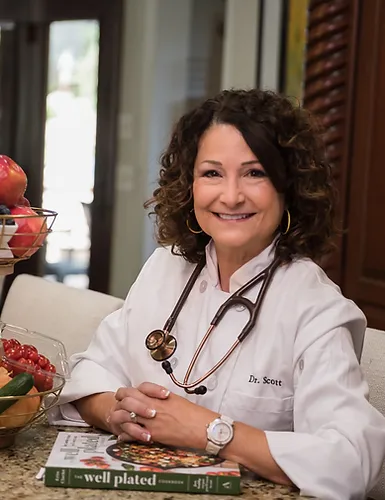Building healthy Habits

Of the many responsibilities of parenthood, I was least prepared for feeding my family well. I can still remember my dread around 4:30 on school nights trying to decide what to make for dinner. My husband was a picky eater, the kitchen was never well stocked, and time was limited for meal preparation. The only resource I had for mealtimes was in glossy magazines or cookbooks. Nutrition and wellness were not in my mindset. My friend and colleague Dr. Denise Scott has written a wonderful, easy to read guide to build a foundation of food knowledge for parents. I wish her book was around when I was scrambling to figure out mealtimes. Feed Your Child’s Future Health is a book written with love and the latest information to support you in building healthy habits when your children are young. Dr. Scott makes the food/health connection clear to empower parents to make a difference for the whole family’s future health.
Digestable information on nutrition
Dr. Scott provides a background of nutrition that is easy to apply right away to your family’s table. In the first part of her book she explains the basics about fats, protein, and carbohydrates. Dr. Scott breaks down science-based information into handy charts (like “Instead of this-Try this”). You can also find research-based guidelines for what children need from trusted resources. As my grown children are now preparing meals in their own homes, I hope they will put their copy of Feed your Child’s Future Health on their kitchen bookshelf.
Feeding Picky eaters

Dr. Scott’s book also has a delightful and fascinating chapter on developing a child’s palate and taste preferences. This is an obstacle for many families. Some children have sensory aversions and anxiety about trying new foods, which makes mealtimes extra tricky. One of my favorite sections reveals which foods resemble the body parts they are good for. Spoiler alert! When you cut a cross section of a carrot it looks like the iris of your eye. It appears that some of our vintage wisdom was right after all. Making food palatable for the pickiest of eaters is a challenge that is worth learning more about. Becoming aware of the “fun facts” of food can help parents talk about mealtimes in a new way.
Author Interview
Dr. Scott sat down for a refreshing conversation about foodstuff and family nourishment.

Food for thought
What would you like us to know about your first career- as a pediatrician?
I practiced pediatrics and pediatric endocrinology for almost thirty years. I am a believer in preventive medicine and being proactive in keeping children safe and healthy. Working with children was often uplifting and the long-term relationships with families invaluable. I still hear from some of my now adult patients, which is very heart-warming.
What prompted you to begin a “new chapter career” in writing and blogging?
After almost three decades in practice, I was ready for a change and found out about culinary medicine. I decided to embark in this relatively new field of medicine. I wanted to bring the wisdom of culinary medicine to pediatrics through my writing.
The past thirty years has shown a rise in the occurrence of adult diseases in children. In my practice I witnessed the beginnings of an epidemic of childhood obesity. I believe that we can change this trajectory that is leading to a shorter lifespan for our children. So much of this is preventable.
Palatable information for parents
Is there anything that surprised you in your research about culinary medicine?
I learned more about nutrition than I ever had in my medical training! Many diseases are preventable through dietary changes. My goal is to convince parents to start early, developing healthy habits to keep their child healthy for the future.
What do you see as the biggest challenges for today’s parents in feeding their children well?
Parents juggle a lot these days. Meals are often on the go, but they don’t have to be expensive or lack nutrition. They can be affordable, convenient, and healthy with some planning and by making many simple substitutions. Most of us don’t realize that much of what we buy is not healthy unless we read the label. Every week I tackle a new topic regarding children’s health and nutrition in my blog.
morsel sized changes with big impact
Can you recommend one small change for parents that want to improve their children’s health?
I would recommend that parents eliminate sugary beverages and to minimize sugar in general. This is the healthiest change a parent can make for their child. The majority of sugar intake comes from sugar-sweetened beverages. Excess sugar intake not only leads to obesity but a multitude of other diseases such as heart and liver disease.
What do you hope parents will remember from your book?
I hope that I have shown in my book that eating healthy is not difficult. I outlined the science behind the recommendations. Honestly, my dream is to empower parents to boycott much of the ultra-processed foods. (The marketing is targeting our children). We can prevent diseases before they begin to enable our kids to live healthy lives free of numerous chronic illnesses.
Potluck resources
Dr. Scott recommends the following links. Each has solid scientific information and some have recipes!
- Nutrition.gov
- myplate.gov
- eatright.org
- healthychildren.org
- feedfuturehealth.com. Check out Dr. Scott’s blog every Wednesday for science based tidbits. Be sure to check out her articles on mental health and nutrition.
Wishing you wellness on your culinary journey and much success in avoiding the 4:30 dread!
Health & Happiness,
Dr. Lisa Marotta

